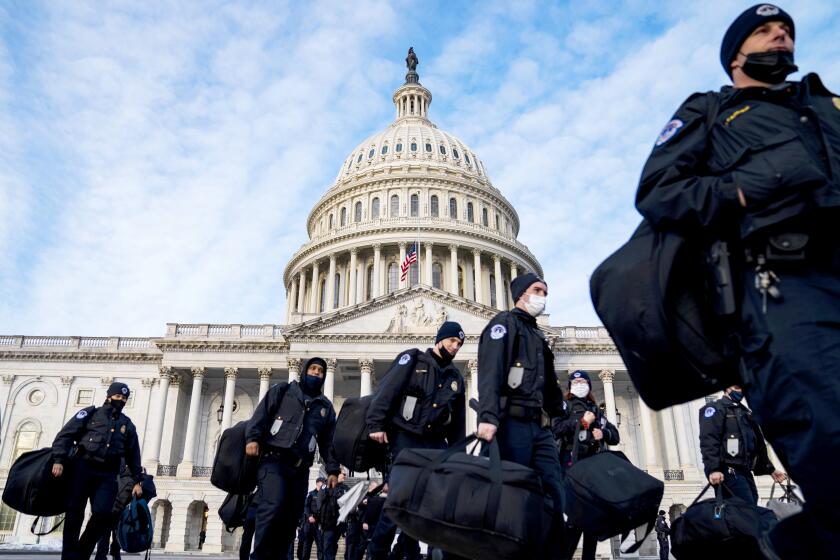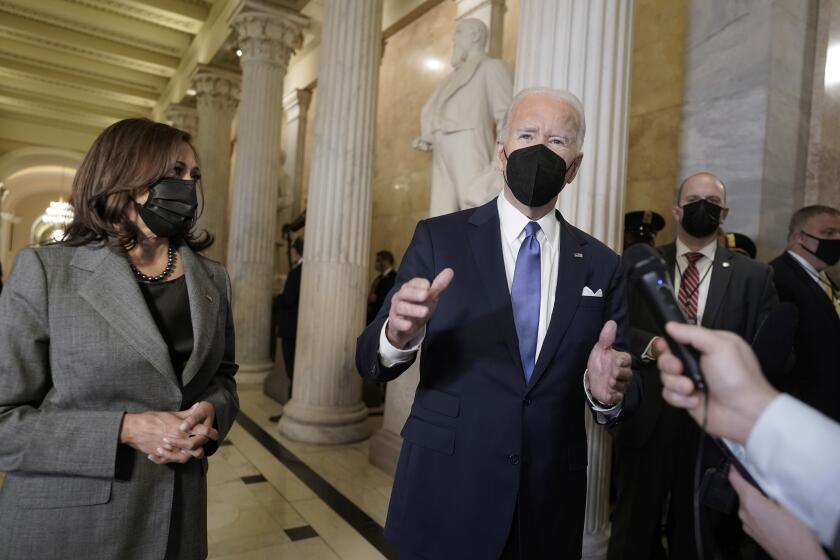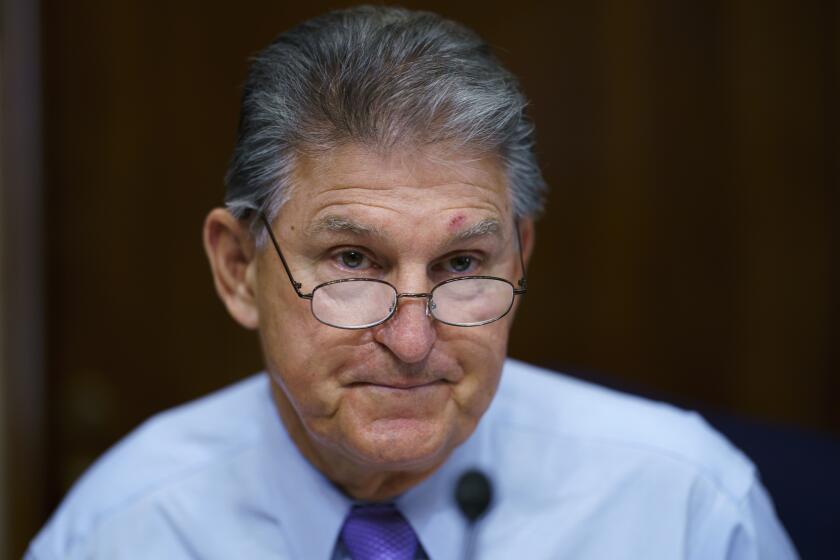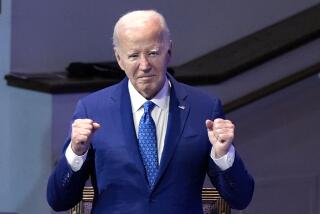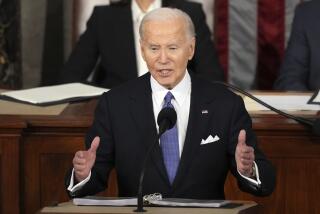President Biden urges filibuster changes to protect voting rights

President Biden calls for changing filibuster rules to protect voting rights. But he still lacks the Senate votes to follow through.
WASHINGTON â President Biden, in a fiery speech Tuesday in Atlanta, called for changing Senate rules in order to pass voting rights protections, going further than he has before in an effort to unify Senate Democrats around what he framed as an existential issue for the country.
Biden, whose support for the legislative filibuster has softened in recent months, endorsed changing the rule that allows the minority party to block any bill that doesnât receive 60 votes.
Lamenting that the Senate where he served 36 years âhas been rendered a shell of its former self,â Biden said that if Republicans continue to block debate on two voting rights bills, âwe have no option but to change the Senate rules ... whichever way they need to be changed.
Decrying a spate of new restrictive voting laws Republicans enacted last year in 19 states, including Georgia, Biden blasted Republicans still in thrall to a âdefeated former presidentâ and his effort âto disenfranchise anyone who votes against him.â His impassioned case for action to protect voting rights was about appeasing party activists as well as securing the necessary votes in Washington.
âAs an institutionalist, I believe that the threat to our democracy is so grave that we must find a way to pass these voting rights bills,â Biden said during a speech at the Atlanta University Center Consortium, a consortium of four historically Black colleges and universities. âLet the majority prevail.â
Noting the difficulty of passing legislation out of an evenly divided Senate â âwe have 51 presidents,â he quipped â Biden urged a small group of holdouts within his own party to consider how their position on this civil rights issue may define their legacy. âI ask every elected official in America: Do you want to be on the side of Dr. King or George Wallace?â Biden said. âThe side of John Lewis or Bull Connor? The side of Abraham Lincoln or Jefferson Davis?â
The Senate, which Democrats control based on Vice President Kamala Harrisâ ability to cast a tiebreaking 51st vote, is poised this week to consider two Democratic measures, previously blocked in the chamber, that aim to defang many of the new voting laws in GOP-led states.
Harris, speaking ahead of Biden, invoked the Rev. Martin Luther King Jr.âs words from decades ago, warning against complacency and acceptance in the face of partisan voting restrictions. âAnti-voter laws are not new in our nation, but we must not be deceived into thinking they are normal,â she said. âWe must not be deceived into thinking a law that makes it more difficult for students to vote is normal.â

Republican senators, she continued, have âexploited arcane rules to block [Democratic voting] bills,â rebutting GOP claims of precedent around the filibuster by asserting that ânowhere does the Constitution give a minority the right to unilaterally block legislation.
âThe Senate must act,â she continued. âWe cannot tell [future generations] that we let a Senate rule stand in the way of our most fundamental freedom.â
The speeches are the sort of energetic, full-throated push for action on the issue of voting rights that many activists have been waiting for since Biden was inaugurated. Several, dismayed that the president until now prioritized a bipartisan infrastructure law and a now-stalled effort to enhance the social safety net over voting rights, opted not to attend the speech and made clear they wonât be satisfied with more words, only action by the Senate.
âIt sets a serious precedent that at the end of the day, when there are people that are coming after your base of voters, right, and youâre stringing it out, and youâre not reacting,â LaTosha Brown, a Georgia-based advocate and cofounder of Black Voters Matter, said on a call with reporters Monday.
âWe donât need another speech. What we need is actually a plan,â said Cliff Albright, executive director of the Black Voters Matter Fund.
One year later, the lies that fueled the Jan. 6 attack remain deeply embedded in American politics.
Martin Luther King III, the son of the iconic civil rights leader, met with Biden and Harris on Tuesday, and said in an earlier statement that he understood the frustration of activists choosing not to attend but remained hopeful a push by the White House could lead to action. âWeâve seen whatâs possible when President Biden uses the full weight of his office to deliver for bridges, and now we need to see him do the same for voting rights,â King said.
Although Bidenâs shift on the filibuster reflects the new consensus among Senate Democrats, he still doesnât have the necessary votes. Changing the rule itself in order to pass voting rights legislation requires the support of all 50 Democratic senators. At least two of them, Sens. Joe Manchin III of West Virginia and Kyrsten Sinema of Arizona have both said they oppose the change.
Thus far, Manchin has shown himself to be impervious to pressure from the White House, if not prickly about it. Just before Christmas, upset that the White House had issued a statement citing his opposition to a major piece of its legislative agenda as a primary reason a vote on the bill was being delayed, he blindsided Biden by going on television to announce he opposed the presidentâs $1.8-trillion âBuild Back Betterâ proposal, a package of tax credits and benefits for working families.
After failing to push through his social spending bill, President Biden turns to voting rights legislation, a pivot advocates say is long overdue.
The setback for Bidenâs social spending bill, his administrationâs focus in the final months of 2021, explains at least in part why the White House is shifting voting rights to the front burner. But altering the filibuster rule is an even heavier political lift than Build Back Better, which Democrats had hoped to pass with 50 votes through the process of budget reconciliation.
Shortly before Bidenâs speech, Manchin continued to throw cold water on the presidentâs push. âWe need some good rules changes to make the place work better,â he said in a brief comment to reporters. âBut getting rid of the filibuster doesnât make it work better.â
Manchin has tried to win Republican backing for a compromise voting rights proposal, so far without success.
Meanwhile, Democrats are set to consider two bills that have already been approved by the House. The Freedom to Vote Act would defang state-led efforts to restrict mail-in or absentee voting, would make election day a holiday, and halt partisan gerrymandering that has drawn congressional districts in a way that dilutes the votes of minority communities. The John R. Lewis Voting Rights Advancement Act would restore anti-discrimination components of the 1965 Voting Rights Act that the Supreme Courtâs conservative majority, arguing that voting rights were now firmly guaranteed, struck down in 2013.
The Senateâs failure to pass voting rights bill is likely to intensify pressure from progressives on Democratic leaders to eliminate the filibuster.
Before delivering their remarks, Biden and Harris, who rarely travel together outside of Washington, visited the crypt of the Rev. King and his wife, Coretta Scott King. They also stopped at the historic Ebenezer Baptist Church, where both Martin Luther King Jr. and the late Democratic Rep. John Lewis, the civil rights hero and Georgia congressman, were eulogized. Upon entering, Biden lowered his face mask to offer a message to voting rights activists: âKeep the faith.â
Accompanying them was Sen. Raphael Warnock, Georgiaâs first Black senator, whose election in one of two runoffs there last January delivered Democrats their 50-seat majority. Warnock, who must run for reelection to a full six-year term in November, is a top target for Republicans and dependent on high turnout from Black voters.
In 2020, Biden won Georgia by just 11,779 votes, a margin that held despite then-President Trumpâs effort to pressure the stateâs top election official, Secretary of State Brad Raffensperger, to overturn the result. Raffensperger, a Republican, held firm in the face of Trumpâs false claims of voter fraud after an increase in mail voting.
But after Biden assumed the presidency, Georgia lawmakers passed one of the countryâs strictest new laws curtailing voting rights: making absentee voting more complicated, limiting the availability of ballot drop boxes, even making it a crime to distribute water to people waiting in line outside polling places.
On Tuesday, Raffensperger held a news conference to criticize Biden and Democrats for what he called âan attempt to weaken election security under the guise of voting rights.â Republican National Committee Chair Ronna McDaniel echoed that position in a statement, dismissing Biden and Harrisâ remarks as âfake hysteria.â
The Rev. Al Sharpton, however, said he told Biden it was a âmonumental speechâ despite coming later than heâd have liked. âBetter late than never,â the civil rights leader went on, stating it now falls to lawmakers to act.
âFor Democrats to not stand up and support the sitting Democratic president will show that they have betrayed their party and the American people,â he said, âand their legacies will be forever tainted.â
More to Read
Get the L.A. Times Politics newsletter
Deeply reported insights into legislation, politics and policy from Sacramento, Washington and beyond. In your inbox three times per week.
You may occasionally receive promotional content from the Los Angeles Times.
